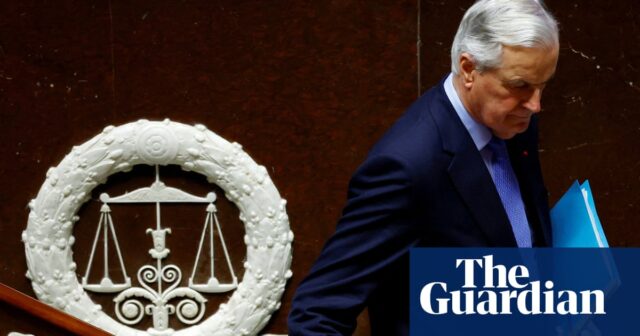The French prime minister, Michel Barnier, is expected to resign on Thursday, a day after his government became the first to be toppled by a no-confidence vote in more than 60 years and just three months after it took office – a record ouster.
Barnier is due to present President Emmanuel Macron with his government’s resignation on Thursday morning. The president would address the nation on Thursday evening, the Elysée said.
“I can tell you that it will remain an honour for me to have served France and the French with dignity,” Barnier said in his final speech before the vote. “This no-confidence motion … will make everything more serious and more difficult. That’s what I’m sure of.”
Barnier’s defenestration comes after snap parliamentary elections this summer, which resulted in a hung parliament with no party having an overall majority and the far right holding the key to the government’s survival.
Macron has the unenviable task of picking a viable successor with over two years of his presidential term left, with some – though not all – opponents calling on him to resign. The fragmented parliament will remain unchanged as no new legislative elections can be held until at least July.
The no-confidence motion, brought by the hard left in the National Assembly, came amid a standoff over next year’s austerity budget, after the prime minister on Monday forced through a social security financing bill without a vote.
With the crucial support of Marine Le Pen’s far-right National Rally, a majority of 331 MPs in the 577-member chamber voted to oust the government.
Speaking on TF1 television after the vote, the National Rally leader, Marine Le Pen, said “we had a choice to make, and our choice is to protect the French” from a “toxic” budget. Le Pen also accused Macron of being “largely responsible for the current situation”, adding that “the pressure on the president of the Republic will get stronger and stronger”.
It was the first successful no-confidence vote since a defeat for Georges Pompidou’s government in 1962, when Charles de Gaulle was president.
Macron flew back into Paris just ahead of the vote after wrapping up a three-day state visit to Saudi Arabia, an apparent world away from the domestic crisis. He strolled earlier on Wednesday through the desert sands of the Al-Ula oasis, marvelling at ancient landmarks. After landing in Paris, he headed directly to the Élysée Palace.
“We are now calling on Macron to go,” Mathilde Panot, head of the parliamentary faction of the hard-left France Unbowed (LFI) party, told reporters, urging “early presidential elections” to solve the deepening political crisis.
Taking care not to crow over the government’s fall, Le Pen said in a television interview that her party – once a new prime minister was appointed – “would let them work” and help create a “budget that is acceptable for everyone”.
But in an editorial, Le Monde said Le Pen had risked upsetting her own supporters, such as retirees and business leaders, by toppling the government.
“In the space of a few minutes, she shattered the strategy of normalisation she had consistently pursued,” the daily said.
Laurent Wauquiez, the head of rightwing deputies in parliament, said the far right and hard left bore the responsibility for a no-confidence vote that will “plunge the country into instability”.
Candidates for the post of prime minister are few, but loyalist defence minister Sebastien Lecornu and Macron’s centrist ally Francois Bayrou are possible contenders.
On the left, Macron could turn to the former Socialist PM and interior minister Bernard Cazeneuve, a contender in September.
Barnier was the fifth prime minister since Macron came to power in 2017, with each serving a successively shorter period. Given the turbulence, the new nominee risks an even shorter term than Barnier, whose tenure was the shortest of any administration since the Fifth Republic began in 1958.
Macron may appoint the new prime minister rapidly, several sources told AFP. A source close to Macron said the president, who has taken time with appointments in the past, had “no choice” but to do so within 24 hours.
Macron has rejected calls to resign.
With markets nervous and France bracing for public-sector strikes against the threat of cuts, action that will shut schools and hit air and rail traffic, there is a growing sense of crisis.
Unions have called for civil servants, including teachers and air-traffic controllers, to strike on Thursday over separate cost-cutting measures.
“His failure” was leftwing daily Liberation’s front-page headline, with a picture of Macron, whose term runs until 2027.
Meanwhile, the president is due to host a major international event on Saturday with the reopening of the Notre Dame Cathedral after the 2019 fire, with guests including Donald Trump on his first foreign trip since he was re-elected.
Agence France-Presse ands Associated Press contributed to this report






